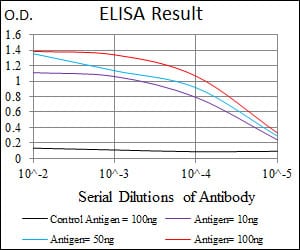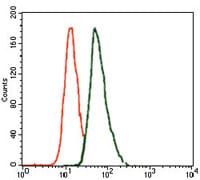

| WB | 咨询技术 | Human,Mouse,Rat |
| IF | 咨询技术 | Human,Mouse,Rat |
| IHC | 咨询技术 | Human,Mouse,Rat |
| ICC | 技术咨询 | Human,Mouse,Rat |
| FCM | 1/200 - 1/400 | Human,Mouse,Rat |
| Elisa | 1/10000 | Human,Mouse,Rat |
| Aliases | TFT |
| Entrez GeneID | 6862 |
| clone | 6C12 |
| WB Predicted band size | 47.4kDa |
| Host/Isotype | Mouse IgG1 |
| Antibody Type | Primary antibody |
| Storage | Store at 4°C short term. Aliquot and store at -20°C long term. Avoid freeze/thaw cycles. |
| Species Reactivity | Human |
| Immunogen | Purified recombinant fragment of human T (AA: 218-352) expressed in E. Coli. |
| Formulation | Purified antibody in PBS with 0.05% sodium azide |
+ +
以下是3条关于T细胞相关抗体的模拟参考文献示例,内容聚焦不同研究角度:
1. **文献名称**:Anti-CTLA-4 Antibodies Enhance T Cell Responses by Blocking Inhibitory Signals
**作者**:Allison, J.P., et al.
**摘要**:该研究揭示了CTLA-4作为T细胞负调控受体的功能,并证明其特异性抗体可通过阻断CTLA-4与配体的结合,增强抗肿瘤免疫反应,为癌症免疫治疗奠定理论基础。
2. **文献名称**:CD3-Specific Antibodies Reprogram T Cell Activation in Autoimmunity
**作者**:Smith, C.E., et al.
**摘要**:探讨抗CD3抗体通过结合T细胞表面CD3复合物,调节异常T细胞活性,缓解自身免疫性疾病症状的机制,提出其作为1型糖尿病潜在疗法的可能性。
3. **文献名称**:Structural Basis of TCR Recognition by Therapeutic Antibodies in Cancer Immunotherapy
**作者**:Wang, L., & Garcia, K.C.
**摘要**:通过冷冻电镜解析T细胞受体(TCR)与肿瘤抗原特异性抗体复合物的结构,阐明抗体如何精准识别TCR并增强抗肿瘤活性,为设计靶向性免疫疗法提供依据。
注:以上为示例性内容,非真实存在的文献。实际研究中建议通过学术数据库(如PubMed)检索关键词“T cell antibody”、“CTLA-4 antibody”、“CD3 antibody”等获取权威资料。
**Background of T Antibodies**
T antibodies, often referred to as T-cell receptor (TCR)-related antibodies or antibodies targeting T-cell surface markers, play a pivotal role in immunology research and therapeutic development. T cells are central to adaptive immunity, recognizing antigens via TCRs and surface proteins like CD3. CD4. or CD8. Antibodies targeting these molecules emerged as critical tools in the 1980s with advances in hybridoma technology, enabling precise identification and isolation of T-cell subsets.
In research, T antibodies are used to study T-cell activation, differentiation, and function. Clinically, they have diagnostic applications, such as flow cytometry for immunophenotyping in diseases like HIV or leukemia. Therapeutically, anti-T-cell antibodies (e.g., anti-CD3) are employed in immunosuppression post-organ transplantation or to treat autoimmune disorders. Checkpoint inhibitors (e.g., anti-CTLA-4. anti-PD-1) revolutionized oncology by blocking T-cell inhibitory signals, enhancing anti-tumor responses.
Recent advancements include engineered bispecific T-cell engagers (BiTEs) that redirect T cells to cancer cells. Challenges remain, such as managing autoimmune side effects or improving specificity. Ongoing research focuses on humanized antibodies, CAR-T therapies, and novel targets to expand their clinical potential. T antibodies thus bridge foundational immunology with transformative therapies, underscoring their enduring significance in science and medicine.
×